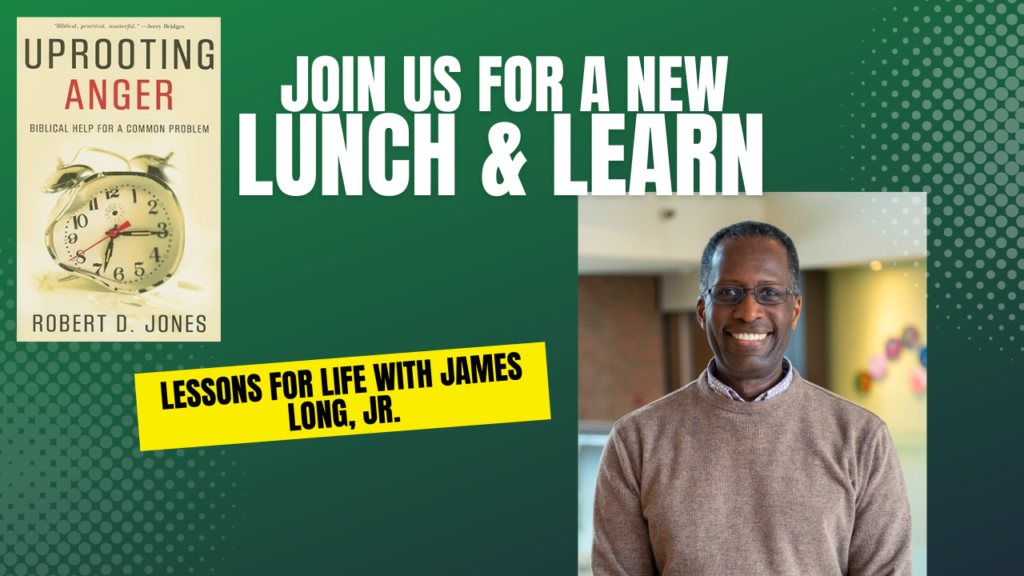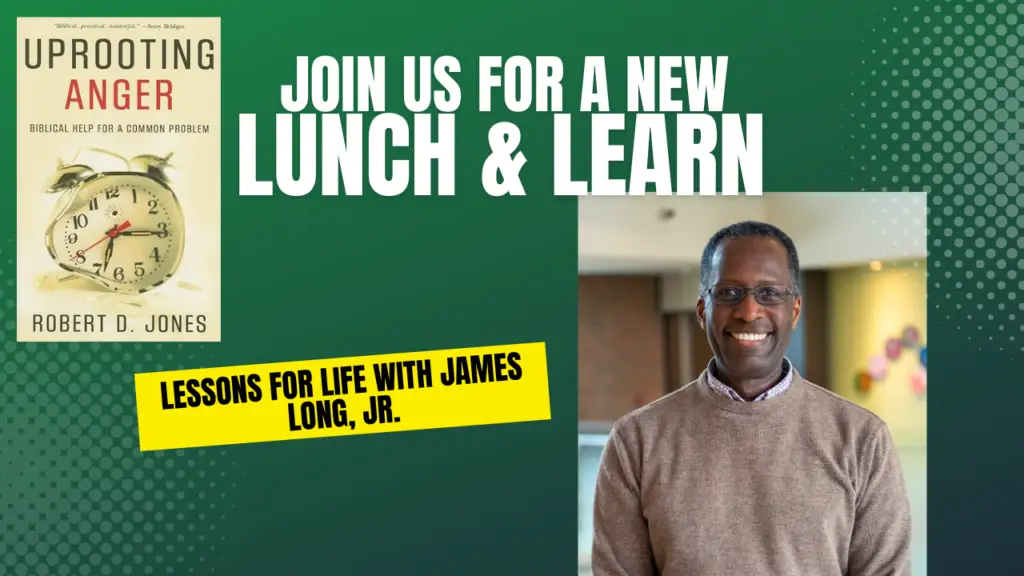Lunch & Learn: Uprooting Anger – Week 1 Recap
Welcome to our first Lunch & Learn! I’m so excited to have you on this journey as we explore Uprooting Anger by Robert Jones. Over the next several weeks, we’ll be diving deep into understanding anger from a biblical perspective and learning how to apply God’s wisdom to uproot it from our lives.
In this first session, we laid the foundation by discussing the key question: What is anger? We explored its definition, how it manifests in our lives, and what the Bible says about it. Whether you were able to join us live or are catching up now, this session provides valuable insights that can help transform your understanding of anger.
Below, you’ll find the full transcript from today’s session, along with key takeaways and action steps to help you reflect on your own experiences with anger and how to begin addressing it.
Thank you for being part of this incredible community! If you missed the live session, you can watch the video on our YouTube channel. Be sure to subscribe and share it with friends and family who might benefit from this series!

Click the image above or this link to watch the video.
Transcript from the Lunch & Learn: Uprooting Anger (September 11, 2024)
Hello, everyone,
It’s James Long Jr., and welcome to our first Lunch & Learn! I am so excited to be here with you today. Thank you so much for joining us. Over the next nine weeks, we will be diving deep into the book Uprooting Anger by Robert Jones, which looks at anger from a biblical perspective and teaches us how to uproot it from our lives.
Today’s session will be foundational as we explore the key question: What is anger? If you haven’t had a chance to get the book yet, I encourage you to purchase it sometime this week. We’ll be meeting every Wednesday for about 30 to 45 minutes, discussing a chapter each week, for a total of nine or ten weeks.
I want to begin by thanking you for being part of our Lessons for Life membership, group coaching program, or Time for Change course and coaching program. I appreciate you taking the time to be here with us today, and I hope you’re enjoying a great lunch as we learn together!
Before we dive in, let me open us in a word of prayer.
Opening Prayer
Father, I thank You for Your amazing grace, kindness, and favor. You are such a great God, and there is none like You. I thank You for the life You’ve given us through Christ—His sacrificial death, His victorious resurrection, His ascension to heaven, and His ongoing intercession for us at Your right hand. We look forward to the day when every knee will bow and every tongue will confess that Jesus is Lord. Until that day comes, Lord, we struggle in this world with conflicts and difficulties. I pray that You would help us to master the anger and struggles we face, and that in doing so, we bring glory and honor to Your name. In Jesus’ name we pray, Amen.
Reflection on 9/11
Today marks 23 years since September 11, 2001, here in the United States. That day was filled with conflict and tragedy, but it reminds us that conflicts are all around us—across the world, in our communities, in our churches, in our marriages, in our families, and even within ourselves. Anger is one of those struggles that many of us face, and over the next several weeks, we’ll learn how to find God’s solutions to the problems we encounter.
What is Anger?
To begin, let’s talk about what anger really is. Anger is mentioned throughout Scripture, and while the Bible does not merely condemn anger, it offers hope and guidance on how to deal with it. Anger is described as a sin that can wage war against our souls, yet not all anger is sinful. Even God experiences anger, and we’ll explore that in more depth today.
As we go through this study, I encourage you to have a journal or notebook with you. I’ll be asking you questions, and I want you to think deeply about your own experiences with anger. It’s important to move from just gathering information to experiencing real transformation.
Consider a time when you felt angry. What triggered your anger? How did you respond in thought, word, or action? Take a moment to reflect on those experiences as we continue.
Defining Anger
Robert Jones, in Uprooting Anger, defines anger as: “Our whole-person active response of a negative moral judgment against perceived evil.”
Let’s break this definition down:
- Whole-personed response: Anger is not just an emotion. It involves your thoughts, beliefs, desires, words, and actions.
- Active response: Anger is something we do, not just something that happens to us. It’s a choice we make in response to what we perceive as wrong.
- Negative moral judgment: Anger is our judgment that something is unjust or evil.
- Perceived evil: It’s important to note that our perception of what is evil may not always be accurate.
As you think about this definition, reflect on how you typically respond to situations that provoke anger. What are some common provocations in your life? It could be traffic, something at work, or a conflict with a family member. Why do these things provoke you? Understanding your own triggers is key to mastering anger in a biblical way.
Anger as an Active Response:
It’s important to remember that anger is something we actively do. Many people believe that anger is something that happens to them, but we need to recognize that we have control over how we respond. If we believe we are helpless in our anger, we will feel the need to control others to stop them from provoking us. But if we realize that our anger is an active response, we can work on controlling ourselves instead.
The fruit of the Spirit includes self-control, and mastering anger involves controlling our thoughts, words, and actions in a way that honors God.
Anger is a Whole-Personed Response
Anger is not just an emotion. It involves our entire being—our beliefs, feelings, thoughts, words, and actions. Therefore, addressing anger requires us to deal with all these components. We need a heart change to experience true freedom from anger.
Anger makes a Negative Moral Judgment
Anger stems from our judgment that something is morally wrong. We often see this in today’s political climate, where people on both sides make negative moral judgments about each other’s beliefs and actions. This leads to conflict instead of resolution. The same happens in our personal lives—we make judgments about others, and this fuels our anger.
Anger Sees an Action as a Perceived Evil
Our anger often arises from our perception of something as evil or wrong. But our perceptions aren’t always accurate. How often have you been angry about something, only to realize later that you were wrong? It’s important to recognize that our perception may not always reflect the truth, and even if it does, our response may not be godly.
A Call to Self-Examination
As we continue this study, I encourage you to think about your own anger. What provokes you? How do you respond, and what are the underlying beliefs or desires that drive your anger? Understanding these elements will help you address your anger from a biblical perspective.
Next week, we’ll dive into the question: Is your anger really righteous? Often, we believe our anger is justified, but we’ll explore whether that’s truly the case.
Closing Thoughts
Thank you for joining me today for our first Lunch & Learn! I hope you found this discussion helpful. Over the next several weeks, we’ll continue to unpack these important topics, and I encourage you to get a copy of Uprooting Anger to follow along.
If you’re interested in going deeper into our work, please consider joining our Lessons for Life community. We offer several membership levels, from our Lessons for Life membership to our group coaching and Time for Change course. You can learn more at james.pixelpropel.com/, where you’ll find resources, blogs, podcasts, and more.
Let me close in prayer:
Prayer
Father, I thank You for this group and for those who joined us today. I pray that You would remind us that You have solutions for the struggles we face, both the conflicts around us and the conflicts within us. Help us to find peace, hope, and joy in Christ, and to live by Your grace and for Your glory. As we remember the events of 9/11, I ask for comfort for the families affected and for peace in our world. May we look to Christ, the Prince of Peace. In Jesus’ name, Amen.
Thank you all for being here today. I look forward to seeing you next week, Lord willing, on Wednesday at 12:00 PM EST. Be blessed and take care!
Take the Next Step on Your Journey
Thank you for joining me today. If you found this lesson helpful, I encourage you to explore more resources and support on my website, https://jameslongjr.org/. You can also watch my video on my YouTube channel.
Finally, would you consider joining our Lessons for Life monthly membership or our online group coaching, where you’ll find powerful coaching videos, a supportive community, and step-by-step guidance for lasting transformation?
Remember, true change is possible when you walk in God’s grace and for His glory. Until next time, may you find peace, hope, and joy in Christ alone. Blessings!


